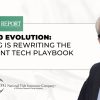

There is a lot of buzz around data these days. Whether you’re using the term “open data,” “big data” or incorporating some other broad adjective, data are central to the discussion of every industry’s future. As every aspect of our world is digitized, lots of new information becomes accessible. In theory, this can help us make more informed, better decisions more easily and quickly than ever before.
“Open data” is based on the idea that if organizations, such as municipalities and governments, make certain data sets publicly available, third parties will incorporate them in the creation of products and services that address public and private needs. The concept is simple — make information available, and people will do useful and interesting things with it.
The open data movement continues to drive innovation across all industries. It will hold especially true in residential real estate for the following reasons:
1. The decision to buy, sell or rent a home is significant. Today’s consumers enjoy nearly unlimited choice and are accustomed to evaluating troves of information for every product purchase decision they make.
2. Real estate is inherently subjective. The “right” conclusion is often different from situation to situation and person to person. Real estate is all about tradeoffs, and house-hunters spend lots of their time (and often their real estate agents’ time) trying to get a handle on them.
3. Most individuals transact infrequently, and preparing them to buy or sell often involves an extended education process and survey of the market. Markets and personal preferences can change drastically between one transaction and the next — even seasoned buyers and sellers may need refreshers.
4. Listing information is just one part of the equation. It is integral to the home search and decision-making process, but is just one of many data sets that should be considered. Nuances at the city, neighborhood, block and even building level can have large effects on the way listing information is interpreted.
Information sets that were previously either unavailable or prohibitively expensive to gather, process and distribute effectively are now open. With the help of continued technological advances, it is becoming possible to distribute data widely at relatively low cost. Certain data sets (such as comprehensive property and building databases, finance and tax records, transit information and geospatial details) collectively represent the foundational context of basic listings information. As more and more of these data sets become publicly available, technology companies continue to aggregate, process and structure the information into formats and tools designed specifically for the real estate industry.
These new products are geared towards empowering agents with tools to provide clients with increasingly personalized and localized services at larger scales.
Open data sets will be seamlessly married to property listings in real-time. As a result, agents will be able to research, develop and share actionable insights with clients in a fraction of the time it currently takes.
Agents can look forward to:
1. Instantly slicing and dicing listings data in any conceivable way.
2. Researching, creating and sharing localized market reports in seconds.
3. Creating fully customized data visualizations in a matter of clicks, tailored to what a particular client wants to see and how they want to see it.
The last decade was about making information digitally available. The next decade will be about making it useful.
In real estate, information is only a means to an end. Data must have context and be personally relevant to be meaningful. Inundated with irrelevant information, a client is likely to either miss what is actually useful or turn elsewhere. Further, relevance varies by market and by person — just as a key metric in Manhattan may not be much of a concern in Houston, a first-time buyer figuring out a career path will often have different priorities than the recent retiree buying for the fourth time. Great agents, therefore, provide each client with personalized, contextualized and actionable insights to help them achieve their goals — there is not a “one-size-fits-all” strategy. Because a significant part of that process involves aggregating, analyzing and presenting information unique to each situation, it can be the limiting factor in the lead to conversion funnel.
Going forward, data-driven millennials, who are conditioned to expect complete personalization in everything from search engine results to algorithmically suggested romantic partners, will become increasingly active in real estate. As that happens, agents’ abilities to quickly provide hyper-personalized insights will become ever-more important. The open data movement is accelerating the creation of products to help do that — agents will soon have a dazzling array of new tools at their fingertips.
Technology companies are competing to provide services to agents. Their goals are centered on helping agents thrive in an increasingly competitive and tech-enabled market. For agents, taking advantage of those services will:
1. Drive ability to take on more business. Agents will be empowered with the ability to provide more clients with differentiated, hyper-personalized services more efficiently.
2. Drive conversion. Agents will seamlessly show clients (through a personalized lens) all the information needed to make the right decision for them, guiding the conversation and minimizing the likelihood that a client feels the need to turn elsewhere.
3. Drive (organic) leads. Ensuring clients transact most efficiently with the best results encourages repeat and referral business.
Great agents add value to their clients’ search and transaction processes on many levels. In the future, real estate brokerage will remain a high-touch business, and the demand for the services of great agents will continue to grow. The open data movement is driving the innovation of products that will help agents keep up with the demand for their expertise while delivering ever-more personalized insights to all clients.
These products, focused on the agent and client experience, will reduce the friction in the process of providing outstanding services and thereby give agents more time to do what they do best.
Brendan Fairbanks is the founder and CEO of Perchwell, a residential real estate discovery and decision engine built for professionals and their clients.
The post How open data will supercharge your business appeared first on WFG National Title Insurance Company.





